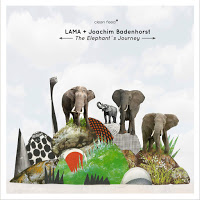[b]By Stef[/b]
I will start my review with a sentence written by our colleague Paul Acquaro for the two previous Lama albums reviewed on this blog :
“The pieces fit together so tightly that there’s hardly room for a wasted note, beat or breath as the musicians move gracefully through the set of songs, nimbly riding the contours between structure and freedom”
This is still the case here. Tightly composed and arranged pieces with Susana Santos Silva on trumpet and flugelhorn, Gonçalo Almeida on double bass, effects and loops, Greg Smith on drums and electronics, and guest musician Joachim Badenhorst on clarinet and bass clarinet.
The album starts with the short “Razor’s Edge“, a tantalising piece full of foreboding created by chimes and distant trumpet sounds that create a spell or magic of some kind, with increasing density as the clarinet and bass join, equally sad and ominous, ending in sparse electronics and crackling noises as a perfect intro for the second track, “The Process“, that is characterised by a wonderful and surprising theme, that jumps all over the place like an acrobat, but without the fun, because the atmosphere is serious, with a moaning clarinet as the first to solo, followed by a sad trumpet and then both swirl and dance around each other in mad circles, fierce and forceful, like antagonists in a story, but then the whole thing collapses and the bass plays a slow few notes, with a fax machine on the background, and the other instruments timidly re-entering the proceedings, unsure of their role, and insecure about what is going to happen, but then the opening theme comes back again and unifies the whole.
The next piece is called “A Hunger Artist” and is without a doubt the most beautiful composition of the year, with a beautiful theme that will stick in your memory forever (hopefully), and with fabulous collective interplay between the four musicians in the more open expansion and development of the theme, which keeps repeating itself despite the changing voices of the four instruments, which shift to anger, despair, joy and fun at the same time, utterly entertaining and beautiful, and like the previous track, somewhere in the middle the music quietens down for heart-rending solos by both clarinet and trumpet without actual resolution.
“Crime And Punishment” is the next piece, and in the meantime the alert listener has understood that all tracks refer to novels or novelists whose names you will find below. The Dostoyevski tune is equally well composed and arranged even if not my favorite of the album.
Gonçalo Almeida opens “Murakami” first arco then pizzi, introducing Badenhorst’s clarinet moving somewhat into the sad territory of subdued klezmer sensitivities, and Santos Silva’s trumpet amplifies the sadness with her beautiful sound, and both horns dialogue full of passion and compassion, supported by the subtle rhythm section. You will not hear anything sadder than this tune this year.
I will not review all tracks, but let me just mention the title song, which is worth mentioning for its inventiveness, humor and joy. And maybe also the closing track, which is again sad and subdued and excessively beautiful.
And basically that sums up the whole album. You get it all, with the right dose, in the right quantities : creativity, musical acumen, instrumental prowess, accessibility and freedom, coherence and variation, and emotional depth in each piece, whether fun or sad. Don’t miss it. It’s another gem that Clean Feed releases this year.
- Razor’s Edge – W. Somerset Maughan
- The Process – Franz Kafka
- A Hunger Artist – Franz Kafka
- Crime And Punishment – Fyodor Dostoyevsky
- Murakami (Japanese novelist)
- The Gorsky’s Spy
- The Elephant’s Journey – José Saramago
- Don Quixote – Manuel de Cervantes


